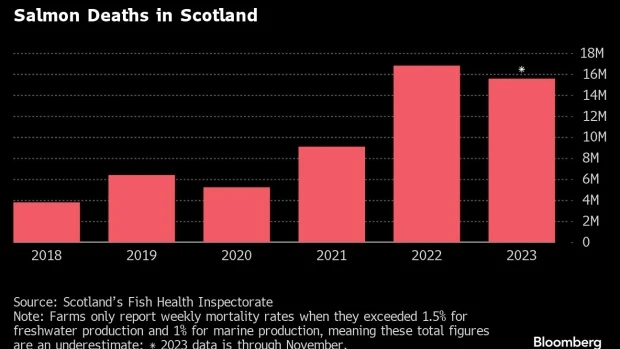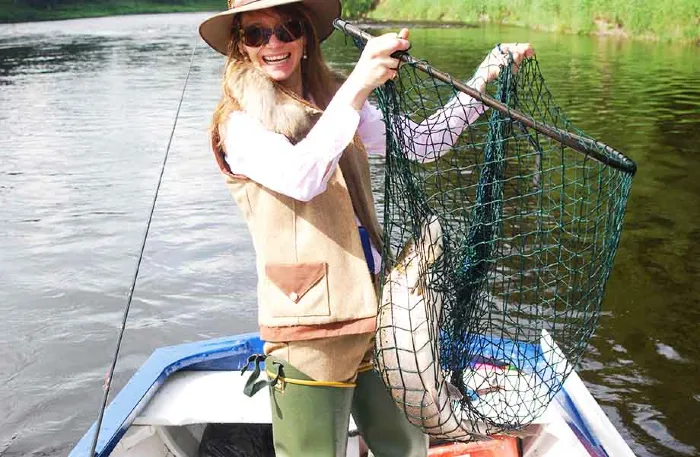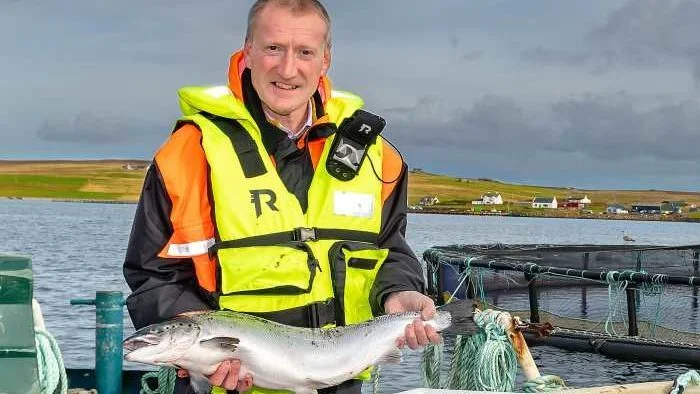In a compelling charge against the organic certification of Scottish farmed salmon, a coalition of 30 charities, conservation, and community organizations, including notable names like WildFish, the Pesticide Action Network, and Blue Marine Foundation, has publicly decried what they term as “unacceptable greenwashing.”
Through an open letter, these groups are demanding that the Soil Association strip away its organic seal from the salmon farming industry in Scotland, citing grave concerns over the sector’s environmental footprint. This stance goes against the Soil Association’s mission to champion healthy, humane, and sustainable food.
Highlighting the crux of their argument, the collective asserts that the industry’s environmental repercussions “run completely counter” to the ethos upheld by the Soil Association. This critique comes at a time when the association has announced plans to revise its standards for organic fish farming, sparking a broader debate on the sustainability and ethical implications of certifying such practices.
The conversation around the environmental impact of salmon farming gained additional prominence with Chris Packham, a well-known broadcaster and the president of the Royal Society for the Prevention of Cruelty to Animals (RSPCA), calling for a moratorium on the industry’s expansion in Scotland. With official figures revealing a surge in farmed salmon mortality rates in 2023 to unprecedented levels, Packham labeled the industry as “catastrophic” for both fish welfare and the environmental integrity of Scotland.
Under the current guidelines set by the Soil Association for organic certification, salmon farms are mandated to implement measures aimed at minimizing their environmental impact and maintaining fish populations at densities lower than those prescribed by other standards, including those of the RSPCA.
Rachel Mulrenan, the Scotland director for WildFish, criticized the organic certification of Scottish salmon as a “misnomer,” pointing out the shared practices between organic and conventional salmon farming in Scotland, notably the utilization of open-net cages that indiscriminately discharge waste into surrounding waters.

Mulrenan highlighted the allowance of “highly toxic chemicals” in organic farms, which she claims could decimate local marine life, along with the controversial use of wild-caught fish for feed and parasite control.
The debate extends to the methods employed in combating parasites and diseases within salmon farms, which pose a threat not only to farmed salmon but also to wild populations.
A report from WildFish titled “Responsibly Farmed?” underscored the application of the chemical pesticide deltamethrin in one Soil Association certified organic salmon farm, despite its high toxicity to aquatic organisms.
Responding to the proposed updates to its fish farming standards, the groups criticized the Soil Association for continuing to allow the use of toxic chemicals like deltamethrin, arguing that these practices and the high mortality rates observed are “indicative of an unsustainable industry.”
The controversy has catalyzed a movement among chefs and restaurants, with over 160 culinary professionals, alongside 50 community groups, charities, and NGOs, endorsing WildFish’s “Off the table” campaign to eschew farmed salmon from their offerings.

Claire Mercer Nairne, owner of the Perthshire-based Meikleour Arms, echoed the sentiment of many in the industry, noting the misleading reassurance provided by organic certification to well-intentioned restaurants. “Many well-meaning restaurants serve farmed salmon because of reassuring organic certification. Organic for most people means better for the environment, but unfortunately in this instance that could not be further from the truth,” stated Nairne.
In defense, a spokesperson from the Soil Association emphasized the stringent criteria required for organic certification, designed to mitigate environmental impacts and promote animal welfare, highlighting an ongoing commitment to advancing sustainable practices within fish farming.
Tavish Scott, CEO of Salmon Scotland, defended the sector’s adherence to top-tier international standards and the pivotal role of organic certification in maintaining Scottish salmon’s premier status globally, dismissing the criticism as coming from merely a handful of activist groups.
“Scotland’s salmon farmers consistently meet the highest international standards and third-party assurance – including organic certification – will continue to play an important part in ensuring Scottish salmon remains the best in the world. We won’t let that global success be put at risk from a handful of urban-based activist groups,” said Scott in a press release.
More To Discover
- Revolutionizing Fabric Recycling: New Method From Denmark Could Transform the Clothing Industry
- Heat Pumps Are Going Industrial: Big Changes, Bigger Savings Ahead
- U.S. Fish and Wildlife Service Declares 21 Species Officially Extinct
- SpaceX Faces Renewed Environmental Lawsuit Over Starship Launches in Texas

8 Concerns Raised Over Scottish Salmon Industry’s Organic Claims
Experts and environmental advocacy groups have raised several concerns about the organic certification of the Scottish salmon industry, labeling it as greenwashing. We read over the reports so you don’t have to, here are the standouts:
- Environmental Impact Contradicts Organic Principles: The primary accusation is that the negative environmental impacts of Scottish salmon farming directly conflict with the Soil Association’s core principles, which promote healthy, humane, and sustainable food. The industry’s practices are seen as incompatible with these values.
- Misleading Use of “Organic” Label: Critics argue that labeling Scottish farmed salmon as organic misleads consumers into believing that the fish are farmed in a manner that is significantly more environmentally friendly and humane than it is. This perception does not align with the realities of salmon farming practices.
- Use of Open-net Cages: Salmon farms, including those certified as organic, typically use open-net cages that allow waste, including feces and uneaten feed, to flow directly into surrounding waters. This method of farming is criticized for polluting local aquatic ecosystems.
- Employment of Highly Toxic Chemicals: Even organic salmon farms are permitted to use chemicals such as deltamethrin, which is highly toxic to marine life. The use of such pesticides to treat parasites like sea lice raises concerns about the harm to surrounding wildlife and contradicts the eco-friendly image suggested by organic certification.
- Dependence on Wild-Caught Fish for Feed and Parasite Control: The industry’s reliance on wild-caught fish to produce feed for farmed salmon and for managing parasites is highlighted as an unsustainable practice that undermines the principles of organic farming.
- Threat to Wild Salmon Populations: Intensive salmon farming has been linked to the spread of parasites and diseases, posing a risk to wild salmon populations, particularly if farmed salmon escape and breed with wild counterparts.
- High Mortality Rates: Record levels of farmed salmon mortality have been cited as indicative of systemic welfare issues within the industry, challenging the notion that organic certification ensures humane treatment.
- Continuation of Questionable Practices in Updated Standards: The proposed updates to the Soil Association’s standards for organic fish farming have been criticized for not adequately addressing the use of toxic chemicals or the industry’s high mortality rates, suggesting a persistence of unsustainable practices despite organic certification.
These points of contention demonstrate a substantial gap between the expectations set by organic labeling and the operational realities of the salmon farming industry. It’s no wonder, experts are calling for a reevaluation of organic certifications and a push for more transparent, environmentally responsible practices.



















